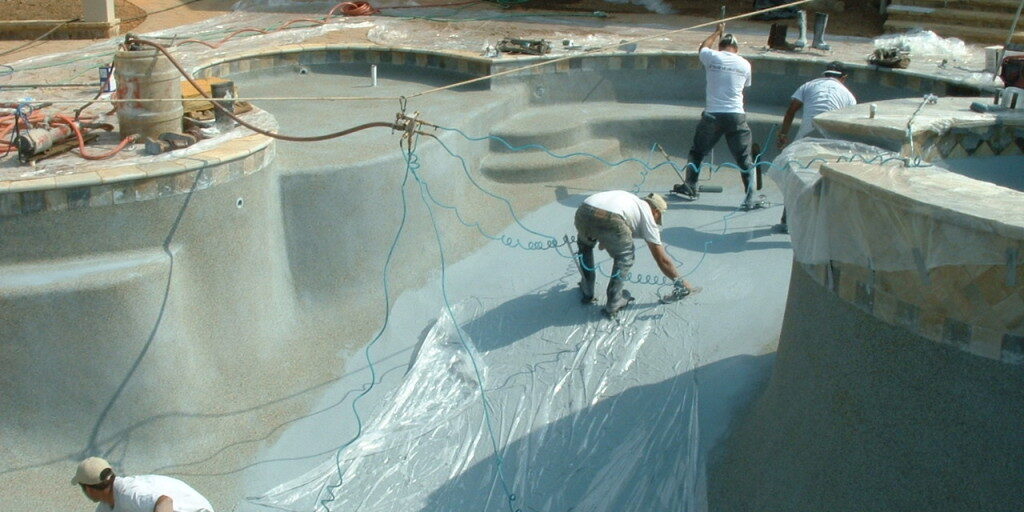If you’re considering adding a swimming pool to your backyard, you’re about to embark on an exciting journey. A swimming pool can transform your outdoor space into a luxurious oasis for relaxation and recreation. However, before you dive into the construction process, it’s essential to understand the permit process, which is crucial in the GTA.
As professional swimming pool builders in Toronto, we understand the importance of a permit to build a pool, and so we have compiled some valuable insights to guide you through the process.
Why It Is Important to Have a Permit to Build a Pool in Toronto
Regulatory Compliance
First and foremost, obtaining the necessary permits ensures that your pool construction project complies with local laws and regulations. Failing to do so can result in costly fines and even the removal of the pool.
Safety
Permits often involve safety inspections and requirements. This ensures that your pool is built with safety in mind, reducing the risk of accidents and injuries.
Environmental Impact
In Toronto, where environmental conservation is a priority, permits may be needed to ensure that your pool construction does not harm the local ecosystem, especially if you live near a watercourse or protected area.
Resale Value
Having the proper permits for your outdoor or indoor swimming pool in Toronto can significantly enhance the resale value of your property. Prospective buyers are more likely to invest in a home with a legal, well-constructed pool.
Peace of Mind
Knowing that your pool is built by professional swimming pool builders in compliance with all regulations can give you peace of mind, allowing you to enjoy your pool without worrying about potential legal issues.
Step By Step Permit Process for Your Backyard Pool
Now that you understand the importance of permits, let’s walk through the step-by-step permit process for building a swimming pool in the GTA.
1. Pre-Review
Before diving into the formal permit process, there are some initial considerations:
Conservation Authority: Depending on your location, you may need to seek approval from the local Conservation Authority, especially if your property is near a watercourse, wetland, or environmentally sensitive area. They will assess the environmental impact of your pool.
Electric Utilities: Consult with your local electric utility to ensure that your pool’s electrical components are installed safely and meet all necessary codes and regulations.
2. Public Works
In this category, two key permits to obtain are:
Lot Grading Permit: This permit ensures that the grading of your property is appropriate to prevent water from flowing into neighbouring properties during heavy rains or poor drainage.
Road Occupancy Permit: If any part of your pool construction, such as a crane or equipment, will encroach on the public road or sidewalk, you’ll need this permit to ensure safety and minimize disruption to the community.
Remember that these initial steps are essential to ensure that your pool construction doesn’t run into complications later in the process. Once you’ve completed these preliminary tasks, you can move on to the formal permit application process.
What You Need to Know When Installing an Inground Pool in Your Backyard
1. Schedule Pre-Construction Meeting
Before the construction of your dream swimming pool begins, it’s essential to schedule a pre-construction meeting with your chosen swimming pool builders. During this meeting, you’ll discuss the following crucial details:
- Design Review: Ensure that your pool’s design aligns with your vision and meets all local bylaws and regulations. Any necessary adjustments should be made at this stage.
- Timeline: Establish a clear timeline for the project, including the start and completion dates. Understanding the schedule will help you plan accordingly.
- Cost Breakdown: Review the final cost estimate, including all expenses such as permits, materials, labour, and any potential additional fees. Make sure you are comfortable with the financial aspects of the project.
- Contract Review: Go over the contract in detail, making sure you understand all terms and conditions. If you have any questions or concerns, this is the time to address them.
2. Pay Deposits and Additional Fees
Once you are satisfied with the pre-construction meeting and contract, it’s time to pay any required deposits and additional fees. The deposit is typically a percentage of the total project cost and serves as a commitment to move forward with the construction. This payment is often required to secure your spot in the swimming pool builder’s schedule.
In addition to the deposit, be prepared to cover any other fees that may arise during the construction process. These could include unforeseen site preparation costs, additional permits, or changes to the original design. By having a contingency budget in place, you can avoid financial surprises.
3. Pool Installation
With permits in hand, contracts signed, and payments made, it’s time for the exciting part – pool installation. Your chosen swimming pool builder will commence the construction process, which typically involves the following stages:
- Excavation: The builder will excavate the designated area for your inground pool, ensuring precise measurements and shape.
- Structural Shell: The pool’s structural shell is installed, which may be made of materials like concrete, fiberglass, or vinyl. This step forms the foundation of your pool.
- Plumbing and Electrical Work: Plumbing and electrical systems are installed to ensure your pool functions correctly and safely. This includes the installation of pumps, filters, lighting, and any additional features.
- Decking and Finishing: The pool area’s surrounding deck and finishing touches are added, creating a seamless and aesthetically pleasing space.
4. Schedule Final Inspections
Once the pool installation is complete, it’s time to schedule the final inspections. These inspections are crucial to ensure that your pool complies with all local regulations and safety standards. They typically cover areas such as fencing, electrical work, and water quality.
Passing these final inspections is essential before you can fill your pool and start enjoying it. Be sure to work closely with your swimming pool builder to address any issues that may arise during inspections promptly.
Commonly Asked Questions
1. Is a Permit Required for an Above-Ground Pool?
In most municipalities within the GTA, you will likely need a permit for an above-ground pool if it exceeds a certain size or depth. While the requirements may vary, it’s essential to check with your local municipal authorities to determine the specific regulations for above-ground pools in your area.
2. What Are the Basic Requirements When Applying for a Pool Permit?
When applying for a pool permit in the GTA, you’ll generally need to provide the following:
- Detailed pool plans and specifications.
- Proof of property ownership.
- Payment of permit fees.
- Compliance with zoning bylaws.
- Safety features like fencing and gates.
- Environmental impact assessment (if required).
It’s advisable to work with experienced swimming pool contractors who can assist you in preparing all necessary documents and ensuring that your application is complete.
3. Does Every Municipality Have Its Own Backyard Pool Regulations?
Yes, many municipalities within the GTA have their own regulations governing backyard pools. These regulations can vary widely from one municipality to another and may include specifications for pool size, setback distances, fencing requirements, and more. It’s crucial to contact your local municipal office or visit their website to access the most up-to-date information regarding pool regulations in your area.
4. Do I Need to Inform My Neighbour I’m Building a Pool?
While there may not be a legal requirement to inform your neighbours of your pool construction plans, it is often considered a courteous gesture. Open communication with your neighbours can help avoid potential disputes and ensure that they are aware of any temporary inconveniences during the construction process, such as noise or increased activity.
5. Is It Necessary to Build a Fence Around the Pool?
Yes, building a fence around your pool is a crucial safety requirement in most jurisdictions, including the GTA. The specific fencing regulations can vary, but common requirements include the fence’s height, type, and the presence of self-closing, self-latching gates. Fencing is a vital safety measure to prevent accidents, especially involving children and pets. It is best to consult experienced swimming pool builders for expert recommendations.
6. How to Create a Backyard Pool Safety Plan?
Creating a backyard pool safety plan is essential to ensure the well-being of your family and guests. Here are some steps to consider:
- Install proper fencing and gates.
- Invest in pool safety covers.
- Provide life-saving equipment like lifebuoys and reaching poles.
- Enforce strict pool rules and guidelines.
- Supervise children and non-swimmers at all times.
- Learn CPR and first aid.
- Keep the pool area free from obstacles and hazards.
- Educate your family and guests about pool safety.
By incorporating these safety measures into your pool area and promoting responsible pool use, you can enjoy your pool while minimizing risks.
How We Can Help You As a Swimming Pool Builders in Toronto
Are you ready to turn your dream of having a stunning pool in Toronto into a reality? Look no further! We are your trusted professional swimming pool builders, dedicated to crafting the pool of your dreams. With years of experience and a passion for creating pool masterpieces, we’re here to guide you through every step of the process.
From concept to construction, our team of experts will work closely with you to design a pool that suits your unique style and space. We handle all the necessary permits, ensuring your pool complies with local regulations. Plus, our commitment to quality means you’ll enjoy a pool that’s built to last.
Contact us at 416.504.5263 or email us a info@landcon.ca to discuss your specific pool design and build requirements. Let’s start building the pool you’ve always wanted. Your perfect pool is just one call away!







